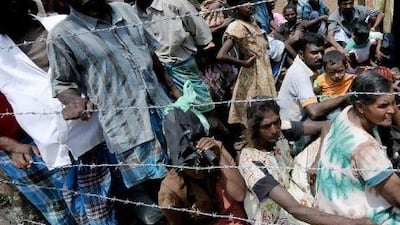NEW YORK // A UN investigation into the end of Sri Lanka's civil war has found "credible allegations" that government forces committed war crimes during a final assault on Tamil separatists that left as many as 40,000 civilians dead.
The UN probe details atrocities by Sri Lankan forces and Tamil Tigers (LTTE) that "would amount to war crimes and crimes against humanity" in early 2009, when a government offensive ended a civil war that had fractured the island for three decades.
The Tamil rebels were wiped out by the campaign, so claims of atrocities have centred on the government troops that allegedly shelled civilians, hospitals and aid worker camps as they encircled the separatists' last stronghold.
The UN panel, appointed by the secretary general, Ban Ki-moon, painted a barbarous picture of the final offensive on the LTTE enclave in north-eastern Sri Lanka, describing the army as using "large-scale and widespread shelling, causing large numbers of civilian deaths".
The government urged Tamil civilians to congregate in so-called "no fire zones" for safety, but then national forces shelled the 330,000 civilians who were trapped inside an "ever-decreasing area" and held hostage by LTTE fighters.
"Tens of thousands lost their lives from January to May 2009, many of whom died anonymously in the carnage of the final few days," said the three-member panel led by the former Indonesian attorney general Marzuki Darsman. "Most civilian casualties ... were caused by government shelling."
The expert panel urged Sri Lankan officials to properly investigate claims and prosecute military chiefs and others behind the atrocities, but noted that previous government attempts fell short of global standards.
The report, which was already dismissed by Colombo as biased and fraudulent and leaked to Sri Lankan media, calls on Mr Ban to establish an "independent international mechanism" to further investigate the conflict's final stages.
Upon releasing the report late on Monday, Mr Ban said such a referral would exceed his authority. His spokesman, Martin Nesirky, said more probing would require "consent or a decision from member states through an appropriate intergovernmental forum".
Atrocities in Sri Lanka cannot be immediately investigated by the International Criminal Court (ICC) because the island is not a member. Previous attempts to address Sri Lanka in the UN Security Council, which is empowered to kick-start an ICC probe, have been blocked.
Both Russia and China can veto any action by the 15-nation council and have argued in support of Sri Lanka and the right of sovereign nations to suppress separatist movements, akin to Russia's battle against Chechen insurgents.
Susan Rice, the United States ambassador to the UN, said Washington supports "justice, accountability, human rights" and a "transparent post-conflict reconciliation process in Sri Lanka" for both government forces and Tamil fighters.
Philippe Bolopion, a UN analyst for the New York-based Human Rights Watch, said there was "no chance of a credible domestic justice process" in Sri Lanka and urged Mr Ban and willing UN states to "lay the groundwork for international prosecutions".
"Because Russia and China are already putting Mr Ban under tremendous pressure not to act, other Security Council members and countries concerned with justice should stand by his side and support him in implementing the panel's recommendations," said Mr Bolopion.
Sri Lanka's government opposed the UN's three-member panel from the outset and has declared the 196-page document "fundamentally flawed" and "based on patently biased material which is presented without any verification".
The report's release comes after two years of souring relations between the UN and Sri Lanka over whether the Sinhalese-led government of President Mahinda Rajapaksa was guilty of military excesses during the final assault on Tamil separatists.
Mr Ban pressed Sri Lankan officials to investigate allegations of war crimes, commissioning a UN investigation to assess Colombo's "accountability processes" last June despite objections from the leadership.
Sri Lankan officials branded the probe "unnecessary interference" and denied panel members visas to visit the island and investigate. Angry nationalists responded by burning an effigy of Mr Ban at the UN office in Colombo.
The crushing defeat of the LTTE in May 2009 ended a conflict that had claimed the lives of some 100,000 since Tamil rebels began fighting for an independent homeland in 1983.
The rebels used suicide bombings and guerrilla tactics and are accused of using child soldiers and human shields. They also shot those who tried to flee during the army's final assault.
Government forces are blamed for the deaths of between 7,000 and 40,000 civilians. Gruesome images have since emerged, including video clips of soldiers laughing while carrying out execution-style killings and photos of naked corpses, blindfolded with hands bound behind their backs, in shallow graves.
Mr Rajapaksa denies the loss of civilian life and said the offensive was necessary to rid Sri Lanka of a terrorist scourge.


